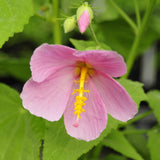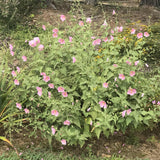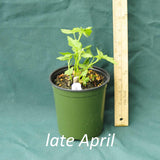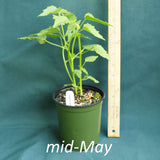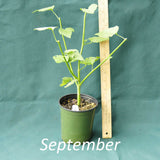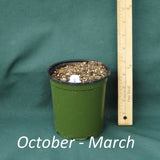Seashore mallow is an adaptable and underused native plant that is still waiting for its chance to bask in the horticultural limelight. Plants will grow in a wide variety of soil types and thrive in gardens hundreds of miles inland from their native coastal habitat.
- Easy to grow
- Hummingbird favorite
- Its hairy stems and leaves are resistant to deer browsing
Details
- 4 to 6 ft. tall and wide
- Stems and leaves die to the ground in the fall and come up again in mid-spring
- Hardy in USDA hardiness zones 6, 7, 8, 9, and 10
Flowering period
In central North Carolina, seashore mallow comes into flower mid to late summer and blooms for up to six weeks.
How to grow
Grow seashore mallow in plenty of sun to promote compact growth and lots of flowers. Plants thrive in rich, moist soil, but are adaptable. Despite its preference for growing wild in shallow standing water, seashore mallow is surprisingly drought tolerant in soil that doesn't drain too quickly.
Care and maintenance
Old flowering stems can be cut back to the ground level in late winter or before growth emerges in spring. Watering during extended droughts will keep plants producing lots of flowers.
Where to plant
Plant seashore mallow in flower beds, edges of ponds and other water features.
When to plant
Anytime throughout the growing season. Keep plants watered until they get established.
When will my plant flower?
Plants purchased and planted in spring and early summer will flower in late summer if planted in a well-prepared site and kept watered.
Native habitat and range
Fresh to brackish tidal marshes from Delaware to southern Florida.
Source and origin
Plants are grown from seeds off stock plants at the nursery. The original plants were grown from seeds collected at the edge of a brackish marsh in Pender County, North Carolina.
Want to learn more? Here is an article we wrote on the merits of seashore mallow.
| States | Orders up to $50 | Orders $51 to $100 | Orders over $100 |
| AL, DE, GA, KY, MD, NC, OH, PA, SC, TN, VA, and WV | $16 | $18 | $20 |
| AR, CT, FL, IL, IN, LA, MA, MI, MO, MS, NH, NJ, NY, RI, VT, and WI | $18 | $20 | $22 |
| IA, KS, ME, MN, OK, and TX | $20 | $22 | $24 |
| CO, NE, ND, and SD | $22 | $24 | $26 |
Sorry, we can't ship plants outside of the continental United States or to AK, AZ, CA, HI, ID, NM, NV, OR, UT, and WA due to agriculture restrictions.
When will my order be shipped?All plants are shipped within two weeks of placing an order.
Is it okay to plant in the winter?Yes, as long as the soil is not frozen. Planting native perennials in winter and early spring gives your plants a head start before the summer heat arrives.
What if it’s too cold to plant where I live, but I want to buy a plant before it sells out?Dormant plants can safely be kept in a basement, garage, or cool room until you are ready to plant in late winter or early spring.
How will my plants get delivered?Most orders are shipped on Monday or Tuesday via UPS Ground, which depending on the destination takes between 1 to 4 days.
Are your plants shipped in their containers?Yes, all our plants are shipped in their growing containers. The majority are grown in containers that are 4.5 inches wide by 5 inches deep and 32 fl. oz. / 946 ml in volume.
Do you guarantee your plants?We guarantee our plants to be healthy, ready for planting and correctly named. We are not able to guarantee whether a plant will grow in your garden as there are too many circumstances that are beyond our control.
On rare occasions, a plant shipped dormant may fail to emerge from its dormancy. If this happens, please let us know. If you are concerned about a plant, please contact us within 14 days to let us know. If we can’t help you make it grow, we’ll send you a new plant or issue a refund.
You can return your plants if you no longer want them once they arrive. To receive a refund (minus 20% restocking fee) the plants must be returned in good condition. Return shipping is the customer’s responsibility.
Can I cancel my order?Yes, you can cancel your order. Please visit our terms and service page for details.
What about sales tax?We propagate our own plants and are not required to collect North Carolina sales tax.
Where can I find information about your plants?Here are some FAQ on how we grow plants.







